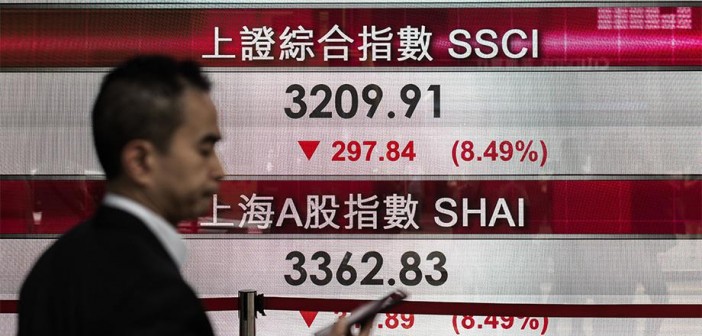This week, the financial situation in China has been making headlines across the world. From the devaluation of the Yuan, to the trillions lost on the Chinese stock exchange, many are wondering how the world’s largest economy will recover, and what it means for the rest of the world. Today, China lowered interest rates causing some to draw comparison to 2008’s credit crunch. We asked the experts, is this the next global financial crisis?
Iqbal Latif, Managing Director, Gulf Real Asset Management
“The Yuan weakening was actually long overdue and the lower interest rates will help the anaemic liquidity”
China is not going to go bust any time soon. We need to look at the fear factor at play here. This week the Shanghai Composite (SSEC) dropped 8.5%, trading down -300 points and was pressing 3200. Back in July Howard Gold’s (Marketwatch) opinion was “China’s stock-market crash is just beginning” writing that “Morgan Stanley which made a good “sell” call on China weeks ago, now expects Shanghai to fall as low as 3,250 by mid-2016.” Now here we are.
The sell off is compounded by the fears that the Chinese economy may be slowing down far more drastically. China’s astonishing move to devalue its Yuan two weeks ago to make its exports competitive, and now its interest rate cuts amid intense measures to boost lending, are adding to the worries.
It is expected that there will be further easing moves and that the central bank is preparing to flood the system with liquidity to increase lending. However China’s economy is still growing at a fast clip compared with Western nations, and China has a vast $3.7 trillion in foreign-exchange reserves to help it weather shocks.
China needs a dose of quantitative easing to cope up with non-performing loans of the banks. The bursting of the property bubble and leveraged punters to the hilt have taken a heavy toll; but luckily the world demand is not slackening. China will continue to be a big exporter. The Yuan weakening was actually long overdue and the lower interest rates will help the anaemic liquidity, although it wouldn’t hurt to consult Bernanke. I see similarities to 2007/8, but the caveat is China is not hugely indebted like the Western countries were when they faced the meltdown.
David Powell, Chief Euro-area Economist, Bloomberg Intelligence
“Growth in the Asian nation would have to slow much more precipitously before it would pose a big threat to the euro-area recovery.”
The biggest hit to the euro-area recovery from the slowdown in the global economy may have come already — from the downturn in Russia. The deceleration in China, by contrast, looks to be a much smaller problem for the monetary union. Growth in the Asian nation would have to slow much more precipitously before it would pose a big threat to the euro-area recovery. Russia has contributed most to the slowdown in foreign GDP growth (weighted by exports from the monetary union), which is the most important determinant of export growth, over the last year knocking 0.23 percentage point off the headline figure. China has chipped away only 0.03 percentage point.
Vasily Koledov, Director at Bluestone Capital Partners and BRIC+ Editor
“Whether there is going to be a major spillover into the world markets depends a lot on market perception.”
Two weeks ago China unexpectedly devalued its currency. This highlighted fears about the state of the Chinese economy and its real estate market, which many believe to be propped up by the government in order to give an appearance of stability. As a result, last week saw an 11.5% fall in the Shanghai Composite Index.
Market participants expected the government might announce a fresh loosening of monetary policy, including reductions in the proportion of deposits that banks need to hold in reserve.
However Beijing did not respond accordingly, as over the last seven weeks they have spent $200bn buying up equities to support prices and nearly $200bn of China’s FX reserves to keep the yuan from falling further since devaluation – likely deeming the operation too expensive.
What followed was yesterday’s crash which saw Shanghai Composite falling 8.5 %, its worst day since February 2007. The losses are continuing today as the market continues to lose faith in Beijing’s ability to prop up the economy.
In order to answer the question fully we must understand the roots of the crisis. Now, whether there is going to be a major spillover into the world markets depends a lot on market perception.
As it stands the majority of economic growth was really the result of governments injecting a lot of cash into the markets. This has led to government debt piling up all across the Western world so cash today has to be paid by debt tomorrow. Now, when you’re full of debt it’s harder to borrow more (or rather print more money thereby devaluing your currency as everyone has been doing) so policy responses to market shocks are now very weak.
So is this the end of the debt supercycle? Potentially. Spillover can be very bad for the wider economy however it is important to understand that the problems here are China specific and panic selling can easily be reversed if sentiment is re-established.
Ian Ivory, Partner at Goltsblat BLP:
“It is difficult to see which countries might gain from this situation – at the moment it is looking like a “lose, lose” outcome”
The slow-down in China will bear difficult consequences for everyone. It will heavily impact the global economy and we can expect to see a sharp fall of demand of goods and services and a significant reduction in global economic growth. The hardest hit will be its direct trading partners and in particular, the emerging economies who are providing raw materials for the One Belt One Road initiative. Russia is another classic example who will feel the pain and China will be a further negative drag on the Russian economy. It also puts into question the economic viability of the proposed energy pipelines between Russia and China. With the reduction in demand and the drop of oil prices, the upfront cost of building these pipelines is a significant burden and must surely put the projects under threat.
However, the reactions from both the mainland and internationally, point to the wider, fundamental concerns around our globalised world and how we function. What is happening in the China cannot be called a blip and is part of a wider, global problem.
Combined with the situation in Greece, the weakness of the Euro, military tensions in the Ukraine and the Middle East, the collapse of oil prices and the asset bubbles forming in a zero interest rate environment, there are some fundamental structural issues that world leaders need to urgently address. It is difficult to see which countries might gain from this situation – at the moment it is looking like a “lose, lose” outcome and the only questions are how long it will last and how deep the effects will be.
Recent events have been a major bump in the road for the global economy and represents a continuation of the volatility we have experienced since 2009. Whether it will lead to a full-blown crisis remains to be seen and it is too early to call at this stage.





